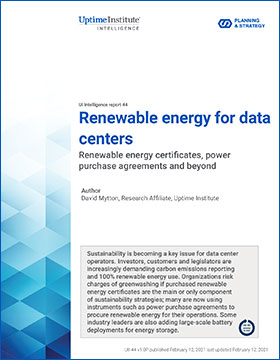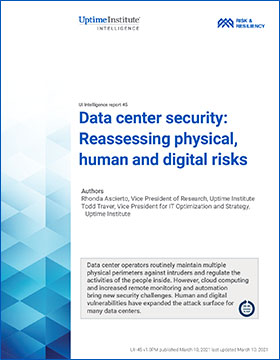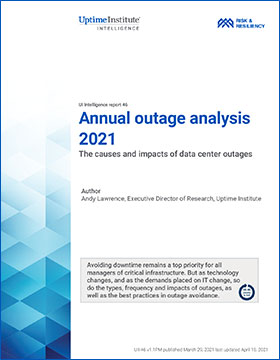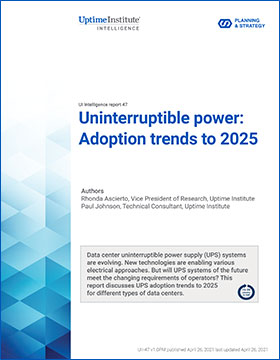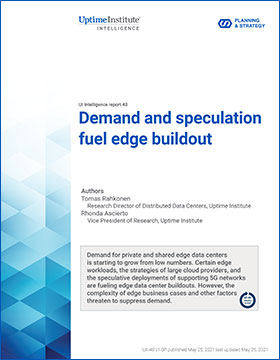
Uptime Institute Intelligence Team 的一句话
去年,数据中心行业发生了前所未有的变化。
我们对数字基础设施的依赖持续快速增长,伴随着全球疫情,造成工人短缺和供应链压力,以我们从未预料到的方式影响行业。
下面,我们总结了 2021 篇主要研究报告,分享了 Uptime Institute Intelligence 全球行业专家团队的见解,以突出过去一年的关键发现,并展望 2022 篇及以后。
- Uptime Institute Intelligence 执行董事 Andy Lawrence
我们对数字基础设施的依赖持续快速增长,伴随着全球疫情,造成工人短缺和供应链压力,以我们从未预料到的方式影响行业。
下面,我们总结了 2021 篇主要研究报告,分享了 Uptime Institute Intelligence 全球行业专家团队的见解,以突出过去一年的关键发现,并展望 2022 篇及以后。
- Uptime Institute Intelligence 执行董事 Andy Lawrence
Uptime Institute 2021 研究回顾
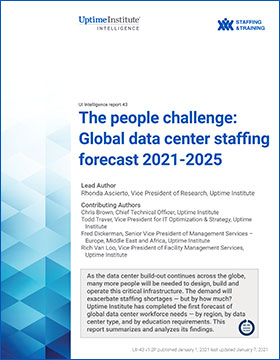
人员挑战:2021-2025 全球数据中心人员配置预测
随着数据中心在全球范围内不断增加,这将需要更多的人员来设计、建造和运营这一关键基础设施。
全球数据中心员工需求预计将从 201900 万到 202500 万的全球约 2.000 万名全职员工,增长到近 2.300 万。大多数需求将来自亚太地区,其次是北美和欧洲、中东和非洲地区。
需求增长将来自云提供商、互联网巨头和托管数据中心。云/互联网巨头的数据中心 - 由主要公共云/互联网公司拥有或租赁的数据中心 - 将需要最多的员工,而且需要很大的利润。
下载链接:
全球数据中心员工需求预计将从 201900 万到 202500 万的全球约 2.000 万名全职员工,增长到近 2.300 万。大多数需求将来自亚太地区,其次是北美和欧洲、中东和非洲地区。
需求增长将来自云提供商、互联网巨头和托管数据中心。云/互联网巨头的数据中心 - 由主要公共云/互联网公司拥有或租赁的数据中心 - 将需要最多的员工,而且需要很大的利润。
下载链接:
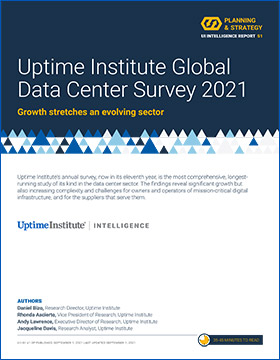
2021 年 Uptime Institute 全球数据中心调查
Uptime Institute 的年度调查现已进入第 11 年,是数据中心行业中最全面、运行时间最长的同类调查。这些发现揭示了任务关键型数字基础设施的所有者和运营商以及为其服务的供应商的显著增长,但也增加了复杂性和挑战。
今年的报告着眼于这个充满活力的市场中技术、人员配备、产能和停电的关键发展。
下载链接:
今年的报告着眼于这个充满活力的市场中技术、人员配备、产能和停电的关键发展。
下载链接:
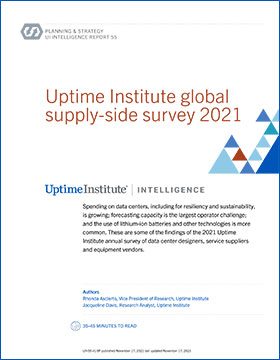
2021 全球供应侧调查
Uptime Institute 对数据中心设计师、顾问和供应商的全球调查 2021 表明,供应商正面临多个方面的扩张。大约80%的人表示,客户支出连续第三年达到或高于正常水平。
近五分之四的供应商已经制定了减少其产品或服务对环境的影响的目标。大多数人在过去两年中重新设计了他们的产品和服务。
在关键工作负载增加的推动下,功率和冷却弹性从 N+1 转变为 N+2。
下载链接:
加入 Uptime Institute 会员
这些 Uptime Institute Intelligence 报告只是 Uptime Institute 会员可用的深度研究和实时市场情报的一小部分。
Uptime Institute 欢迎数字基础设施的所有者和运营商加入我们即将举行的会员活动。
如需请求访问宾客,请访问我们网站上的 Uptime Institute 会员页面,并填写“以宾客身份加入我们表格”开始!
Uptime Institute 欢迎数字基础设施的所有者和运营商加入我们即将举行的会员活动。
如需请求访问宾客,请访问我们网站上的 Uptime Institute 会员页面,并填写“以宾客身份加入我们表格”开始!

